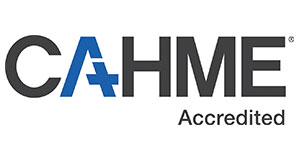Earn your master’s degree and advocate for equity and high-quality care among diverse populations as an innovative health services leader or administrator. The Master of Health Administration (MHA) program features a 48-credit curriculum that can be completed on campus on Long Island, New York, or anywhere online. This curriculum is designed to develop and strengthen your health services knowledge, as well as your leadership and communication skills, so that you can effectively and ethically manage your organization. With Hofstra University’s health administration master’s degree, you’ll be able to develop and lead health services in settings such as hospitals, healthcare facilities, for-profit and nonprofit organizations, insurance and pharmaceutical companies, and consulting firms.
Choose Your MHA Program
Residential In-Person MHA Program
The CAHME-accredited, in-person program combines traditional study with field-based experience to give you contextual and practical strategies to apply to your current organization. Most courses are taught by health service practitioners and leaders who offer networking and learning opportunities to encourage your professional growth. You’ll be assigned a faculty advisor who will help you schedule your courses around your current schedule. The program can be completed in two years, and you can choose between part-time and full-time, and switch between the two options as needed.
Online MHA Program
The online MHA program utilizes an asynchronous learning approach so that have the flexibility to access and complete weekly modules and assignments from any location and at your preferred time. Program faculty provide weekly learning material (including recorded lectures, readings, and activities) for you to complete and are always available to give feedback and guidance on content. Complete your assignments on your own time and engage in interactive activities with peers. With this online curriculum, you have the flexibility to learn wherever and whenever.
Health Administration at Hofstra
Take a closer look at what the in-person and online programs offer and how Hofstra can fund and support your continuing education.

Why Hofstra?
Engaging Student Experience
Connect with your classmates and network with graduated students who are working your field.
Professional Opportunities
With this career-focused degree, internships are integrated into the curriculum to develop your skills and better you as a practitioner.
With a Master of Health Administration degree, there are a variety of job positions to choose from.

Program Directory
Program Director
Edward Coffield, PhD
Associate Chair and Associate Professor, Department of Population Health
Phone: 516-463-7019






